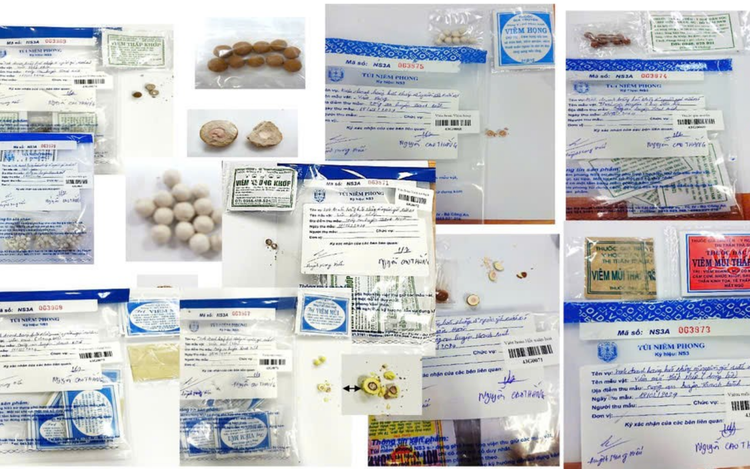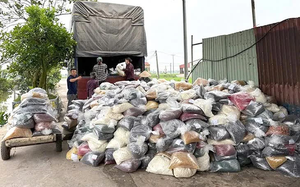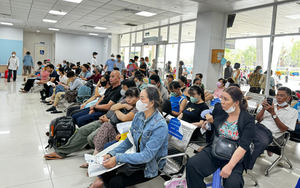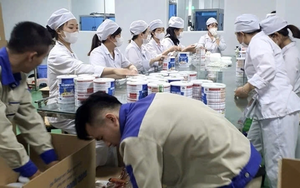
Several medicines fail to meet quality standards after testing. Photo: Thuy Duong / Tuoi Tre
Despite rigorous crackdowns, the illegal production and sale of fake items—from medicine and dairy products to daily food staples like MSG, fish sauce, and coffee—remain rampant across the country.
Fake medicine: Threat at core of healthcare
In 2014, a scandal involving counterfeit cancer medicine shocked the nation.
The case implicated former Deputy Minister of Health Truong Quoc Cuong and several other pharmaceutical officials linked to VN Pharma.
The fraudulent medicine was distributed widely, endangering countless lives and exposing glaring loopholes in regulatory oversight.
Despite regular crackdowns, authorities across the country continue to detect numerous counterfeit drug trading and production cases each year.
More recently, the Ho Chi Minh City People’s Court convicted 11 individuals for manufacturing and selling counterfeit medication, including fake deworming pills and medicines for vaginal infection treatment.
In another case in September last year, the High People's Court in Hanoi sentenced Pham Van K., a pharmacist and graduate of Hanoi University of Pharmacy, to five years and six months in prison for producing fake pharmaceuticals and forging official documents.
Counterfeit nutrition and food: daily danger
The counterfeit threat extends well beyond medicine.
In 2021, Nguyen Trung V. was found guilty of producing nearly 27,400 units of fake nutritional supplements and special dietary food.
Tests revealed that at least one quality indicator in each product reached below 70 percent of registered standards.
The total value of the fraudulent goods amounted to VND4.4 billion (US$170,260), leading to a prison sentence of four years and six months for V..
Daily-use products are no exceptions.
In Dong Nai Province, a neighbor of Ho Chi Minh City, Ngo Van Th. was penalized in 2022 for selling counterfeit MSG under the Ajinomoto brand, fake Knorr seasoning, and fake Nam Ngu fish sauce.
In 2023, when coffee prices were soaring in Dak Lak Province in the Central Highlands region, Vo Nguyen V. packaged roasted soybeans with artificial coffee flavoring.
Between March and April 2024, he sold 219 fake coffee packages weighing 109.5 kilograms valued at VND104 million ($4,015).
He was given a suspended sentence of two years and three months by the Buon Ma Thuot court.
Fake plants and herbicides
The counterfeit trend also impacts agriculture.
In early 2024, Luu Van Ch. created a fake Facebook page called ‘Kon Tum Province Crop Seed Center’ to sell fake Ngoc Linh-branded ginseng plants.
He substituted the high-value ginseng with panax pseudoginseng, a visually similar but far less valuable plant, and misled buyers with a fake sender identity.
When one customer discovered the deception, he reported the case to the police.
Ch. received a suspended 13-month prison sentence for selling fake goods.
From April 2022 to May 2023, Tran Minh T. and Tran Ngoc T. distributed 1,740 bottles of counterfeit herbicides, valued at VND297 million ($11,490).
In late September last year, they were fined VND700 million ($27,018) and VND500 million ($19,300) respectively by the court in Tran Yen District under Yen Bai Province, northern Vietnam.
Harsh penalties, but violations remain
According to lawyer Le Van Hoan of the Ho Chi Minh City Bar Association, Vietnam’s Penal Code defines four specific offenses related to counterfeit goods.
The harshest penalties include life imprisonment or even the death penalty for those found guilty of producing fake medicine or food.
Those violating other offenses such as counterfeiting fertilizer, animal feed, or plant varieties, shall be sentenced up to 20 years.
However, despite these strict penalties, violations continue to proliferate across sectors and regions.
The lack of effective monitoring and enforcement, along with limited accountability for responsible agencies, is believed to allow counterfeit networks to flourish.





Max: 1500 characters
There are no comments yet. Be the first to comment.